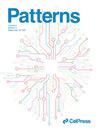一个准确的模型会是坏的吗?
IF 6.7
Q1 COMPUTER SCIENCE, ARTIFICIAL INTELLIGENCE
引用次数: 0
摘要
正如Van Amsterdam等人最近发表的一篇《模式》(Patterns)论文所显示的那样,结果预测模型即使准确度很高,也会对患者造成伤害。在本预览中,我们通过强调具体化自我实现预言的影响,考虑了这项工作的伦理和经验意义,并提出了将准确性作为人工智能集成优先事项的重新定位。本文章由计算机程序翻译,如有差异,请以英文原文为准。
Can an accurate model be bad?
Outcome-prediction models can harm patients even when they have good accuracy, as shown in a recent Patterns paper by Van Amsterdam et al. In this preview, we consider the ethical and empirical implications of this work by highlighting the impact of reifying self-fulfilling prophecies and propose a reorientation toward actions over accuracy as a priority for AI integration.
求助全文
通过发布文献求助,成功后即可免费获取论文全文。
去求助
来源期刊

Patterns
Decision Sciences-Decision Sciences (all)
CiteScore
10.60
自引率
4.60%
发文量
153
审稿时长
19 weeks
期刊介绍:
 求助内容:
求助内容: 应助结果提醒方式:
应助结果提醒方式:


